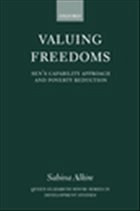- In-depth study and practical development of Amartya Sen's capability approach
- Wide appeal for economists, philosophers, development practitioners, and theologians
Alkire examines how Nobel Prize-winning economist Amartya Sen's capability approach can be coherently-and practically-put to work in participatory poverty reduction activities. Sen argues that economic development should expand 'valuable' capabilities. Alkire probes how we identify what is valuable.
Sen deliberately left the capability approach 'incomplete' in order to ensure its relevance to persons and cultures with different understandings of the good. Part I proposes a framework for identifying valuable capabilities that retains this 'fundamental' incompleteness and space for individual and cultural diversity. Drawing on the work of John Finnis and others, Alkire addresses foundational issues regarding the identification and pursuit of 'valuable' dimensions of human development based in practical reason, then observes that much of the criticism of development arises from negative impacts on social or cultural/religious dimensions that are also deeply valued by the poor. Part I closes with a four-part 'operational definition' of basic capability that bridges 'basic needs', participation, and informed consent.
Part II proposes an alternative participatory method for systematically identifying valued changes in participants' capability sets. Three case studies of women's income generation activities in Pakistan---goat-rearing, adult literacy, and rose cultivation---contrast economic cost-benefit analysis of each activity with capability analysis.
Reviews
- '... essential reading for anyone who wants to take the capability approach forward, and it will certainly become a reference point for much future work in this area.' -Economics and Philosophy
- 'This book is very careful and accurate in its explanation of Sen's work. It is very well referenced and Alkire demonstrates a profound knowledge of Sen's work. Valuing Freedoms provides a detailed example of how the capability approach can be used for a very messy and practical task, without systematically narrowing the approach down to a technical tool or an algorithm that 'measures' non-quantifiable dimensions. As such, it should be able to convince quite a few critics.' -Economics and Philosophy
- 'Valuing Freedoms is a major contribution to the further development and advancement of the capability approach.' -Economics and Philosophy
- '... the book is well-referenced and contributes to the development of Sen's capability approach ... good reading for economists and non-economists interested in the capability approach.' -Journal of International Development
Contents
- 1 INTRODUCTION: CAPABILITY AND VALUATION
- 2 POVERTY AND HUMAN DEVELOPMENT
- 3 RANGE INFORMATION AND PROCESS
- 4 PARTICIPATION AND CULTURE
- 5 BASIC NEEDS AND BASIC CAPABILITIES
- 6 ASSESSING CAPABILITY CHANGE
- 7 THREE CASE STUDIES
- Wide appeal for economists, philosophers, development practitioners, and theologians
Alkire examines how Nobel Prize-winning economist Amartya Sen's capability approach can be coherently-and practically-put to work in participatory poverty reduction activities. Sen argues that economic development should expand 'valuable' capabilities. Alkire probes how we identify what is valuable.
Sen deliberately left the capability approach 'incomplete' in order to ensure its relevance to persons and cultures with different understandings of the good. Part I proposes a framework for identifying valuable capabilities that retains this 'fundamental' incompleteness and space for individual and cultural diversity. Drawing on the work of John Finnis and others, Alkire addresses foundational issues regarding the identification and pursuit of 'valuable' dimensions of human development based in practical reason, then observes that much of the criticism of development arises from negative impacts on social or cultural/religious dimensions that are also deeply valued by the poor. Part I closes with a four-part 'operational definition' of basic capability that bridges 'basic needs', participation, and informed consent.
Part II proposes an alternative participatory method for systematically identifying valued changes in participants' capability sets. Three case studies of women's income generation activities in Pakistan---goat-rearing, adult literacy, and rose cultivation---contrast economic cost-benefit analysis of each activity with capability analysis.
Reviews
- '... essential reading for anyone who wants to take the capability approach forward, and it will certainly become a reference point for much future work in this area.' -Economics and Philosophy
- 'This book is very careful and accurate in its explanation of Sen's work. It is very well referenced and Alkire demonstrates a profound knowledge of Sen's work. Valuing Freedoms provides a detailed example of how the capability approach can be used for a very messy and practical task, without systematically narrowing the approach down to a technical tool or an algorithm that 'measures' non-quantifiable dimensions. As such, it should be able to convince quite a few critics.' -Economics and Philosophy
- 'Valuing Freedoms is a major contribution to the further development and advancement of the capability approach.' -Economics and Philosophy
- '... the book is well-referenced and contributes to the development of Sen's capability approach ... good reading for economists and non-economists interested in the capability approach.' -Journal of International Development
Contents
- 1 INTRODUCTION: CAPABILITY AND VALUATION
- 2 POVERTY AND HUMAN DEVELOPMENT
- 3 RANGE INFORMATION AND PROCESS
- 4 PARTICIPATION AND CULTURE
- 5 BASIC NEEDS AND BASIC CAPABILITIES
- 6 ASSESSING CAPABILITY CHANGE
- 7 THREE CASE STUDIES

